During the Davis City Council meeting, the council approved a motion to create a progression plan that will eventually ban gas-powered leaf blowers and small off-road engines
By HANNAH SCHRADER — city@theaggie.org
At the Davis City Council meeting on Jan. 16, the council unanimously approved the motion to create a transitory plan that eventually bans gasoline-powered leaf blowers and small off-road engines (SORE).
The leaf blower ban was initially brought before the city council in January of 2022 when council members decided not to move forward with a ban. Instead, the city continued to survey the use of gas-powered leaf blowers and research battery-power alternatives.
Adrienne Heinig, the deputy director of public works for the city of Davis, discussed a path forward for the city to move toward battery-powered leaf blowers while considering the possible difficulties.
“At this time, we are not recommending a full ban on gas-powered leaf blowers or other small off-road engine equipment because we do still need to be able to use this equipment where there is not a battery-powered facsimile,” Heinig said.
Heinig introduced the background of this agenda item, sharing that this conversation is in response to AB 1346, which restricts the sale of small off-road engines in California.
“Back in 2018 there was an introduction of AB 1346, which effectively bans the sale of new small off-road engines, also called SORE-powered equipment, in the state of California after 2024,” Heinig said. “So this does mean that equipment that was made in 2024 or after can only be sold in the state of California if it is battery powered.”
A study done by the Illinois Waste Management and Research Center found leaf blowers to be markedly harmful to our air quality, producing emissions comparable to 100,000 passenger cars annually.
Davis resident Tom Schmidt expressed concern about using gas-powered leaf blowers and believes the city needs to restrict these tools.
“I know a lot of cities in California have banned leaf blowers for many reasons,” Schmidt said. “I don’t think there’s a whole lot of research to do if we were to just get ahold of Berkeley [and] Orange California [who] outlawed leaf blowers when they first came out. They did a huge study about the particulates that they throw up in the air. The herbicides, the pesticides, the dog feces, everything that is supposed to land on the ground is now again back up in the air, and for somebody with emphysema, it is very difficult.”
Artem Lada, a researcher at UC Davis with a Ph.D. in cancer research, talked at the council meeting about the dangers of leaf blowers due to their carcinogenic emissions.
“Now we know very well from science that the exhaust of the leaf blowers contains so many carcinogens in such large quantities,” Lada said. “This is directly inducing cancer in the population and in animals [like] in pets. So I’m a scientist, I spend quite a bit of time looking at the genomes of cancer patients, and we now have the technology to see this course of the DNA […] of this patient from the very same chemicals exhausted from the gas-powered leaf blowers.”
Local Davis resident Alan Hirsch talked about the City of Davis’ lack of regard for the more harmful greenhouse-gas-emitting city projects.
“We should spend as much time on the one or two tons maybe of greenhouse gasses that come out the leaf blowers as out of the 72,000 tons of greenhouse gasses that come out of I-80,” Hirsch said. “We talk about the noise of leaf blowers, well, I can hear constantly — 24 hours a day — the freeway noise but there was no discussion of that at the approval meeting at the Yolo transportation district about it.”
Written by: Hannah Schrader — city@theaggie.org











